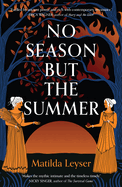
Matilda Leyser's debut novel, No Season but the Summer, brings the Greek myth of Persephone into modern times. It's an imaginative story of power, voice, and womanhood.
For 9,000 years, Persephone has been seen as a mere object to passed back and forth, rather than her own person. Her mother, Demeter, yearns for her. "I gave her light, warmth, water, nourishment. Why did she not grow towards me?" she reflects. Persephone's husband, Hades, steals her away, her consent questionable at best, to an underworld in want of a queen. Her father, Zeus, decrees that she will split her time between the two in order to spare the world from the destructive effects of her mother's despair. "Every year is shared--spring and summer are my mother's time, autumn and winter are my husband's," Persephone explains. "Nothing left for me. But it was for the best, they said."
As the novel opens, this ancient rhythm is shifting. Persephone crawls upward through cracks in the earth and emerges into a rapidly changing world marked by climate change, angry environmental activists, felled trees, and increasingly obsolete yet still eternal gods. This premise sets Leyser's mythological reworking apart from more conventional retellings: No Season but the Summer is more a continuation of an ancient myth than a true retelling of it. Leyser incorporates the mythology of the past into some of the most pressing narratives of the present, and the result is a brilliant novel that urges readers to think about personhood, motherhood, agency, and the world we shape--for better or for worse--through belief and action. --Kerry McHugh, freelance writer

